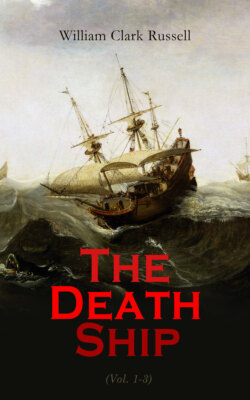Читать книгу The Death Ship (Vol. 1-3) - William Clark Russell - Страница 5
На сайте Литреса книга снята с продажи.
CHAPTER I.
I SAIL AS SECOND MATE IN THE SARACEN.
ОглавлениеTable of Contents
I will pass by all the explanations concerning the reasons of my going to sea, as I do not desire to forfeit your kind patience by letting this story stand. Enough if I say that after I had been fairly well grounded in English, arithmetic and the like, which plain education I have never wearied of improving by reading everything good that came in my way, I was bound apprentice to a respectable man named Joshua Cox, of Whitby, and served my time in his vessel, the Laughing Susan—a brave, nimble brigantine.
We traded to Riga, Stockholm, and Baltic ports, and often to Rotterdam, where, having a quick ear, which has sometimes served me for playing upon the fiddle for my mates to dance or sing to, I picked up enough of Dutch to enable me to hold my own in conversing with a Hollander, or Hans Butterbox, as those people used to be called; that is to say, I had sufficient words at command to qualify me to follow what was said and to answer so as to be intelligible; the easier, since, uncouth as that language is, there is so much of it resembling ours in sound that many words in it might easily pass for portions of our tongue grossly and ludicrously articulated. Why I mention this will hereafter appear.
When my apprenticeship term had expired, I made two voyages as second mate, and then obtained an appointment to that post in a ship named the Saracen, for a voyage to the East Indies. This was anno 1796. I was then two-and-twenty years of age, a tall, well-built young fellow, with tawny hair, of the mariner's complexion from the high suns I had sailed under and the hardening gales I had stared into, with dark blue eyes filled with the light of an easy and naturally merry heart, white teeth, very regular, and a glad expression as though, forsooth, I found something gay and to like in all that I looked at. Indeed it was a saying with my mother that "Geff,"—meaning Geoffrey—that "Geff's appearance was as though a very little joke would set the full measure of his spirits overflowing." But now, it is as an old poet finely wrote:
My golden locks time hath to silver turn'd,
(O time, too swift, and swiftness never ceasing!)
My youth, 'gainst age, and age at youth have spurn'd,
But spurn'd in vain!
And here it is but right to myself that I should say, though as a sailor I am but an obscure person, yet as a man I may claim some pride and lustre of descent, an ancestor being no less a worthy than one of the boldest of Queen Elizabeth's sea-captains and generals—Edward Fenton, I mean, who was himself of a sound and ancient Nottingham stock; illustrious for his behaviour against the Spaniards in 1588, and for his explorations of the hidden passage of the North Sea, mentioned with other notable matters in the Latin inscription upon his monument by Richard, Earl of Cork, who married his niece.
But enough of such parish talk.
The master of the Saracen was one Jacob Skevington, and the mate's name Christopher Hall. We sailed from Gravesend—for with Whitby I was now done—in the month of April, 1796. We were told to look to ourselves when we should arrive in the neighbourhood of the Cape of Good Hope, for it was rumoured that the Dutch, with the help of the French, were likely to send a squadron to recover Cape Town, that had fallen into the hands of the British in the previous September. However, at the time of our lifting our anchor off Gravesend, the Cape Settlement lay on the other side of the globe; whatever danger there might be there, was too remote to cast the least faint shadow upon us; besides, the sailor was so used to the perils of the enemy and the chase, that nothing could put an element of uneasiness into his plain, shipboard life, short of the assurance of his own or his captain's eyes that the sail that had hauled his wind and was fast growing upon the sea-line, was undeniably an enemy's ship, heavily armed, and big enough to cannonade him into staves.
So with resolved spirits, which many of us had cheered and heartened by a few farewell drams—for of all parts of the seafaring life the saying good-bye to those we love, and whom the God of Heaven alone knows whether we shall ever clasp to our breasts again, is the hardest—we plied the capstan with a will, raising the anchor to a chorus that fetched an echo from the river's banks up and down the Reach; and then sheeting home our topsails, dragging upon the halliards with piercing, far-sounding songs, we gathered the weight of the pleasant sunny wind into those spacious hollows, and in a few minutes had started upon our long journey.
Yet, though my parting with my friends had not been of a nature to affect my spirits, and though I was accounted to be, and indeed was, a merry, careless fellow, I was sensible of an unaccountable depression as, amidst the duties which occupied me, I would cast glances at the houses of Gravesend and the shore sliding by, and hear, in momentary hushes, tremulous tinkling sounds raised by the water wrinkling, current-like under our round and pushing bows.
